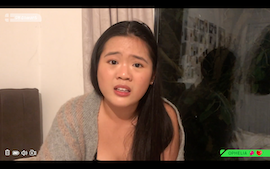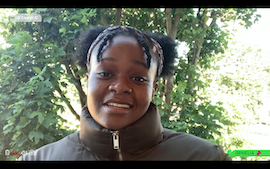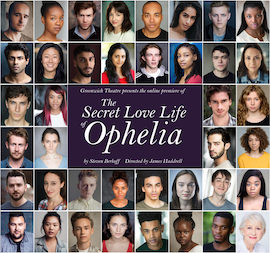Interview: James Haddrell Talks THE SECRET LOVE LIFE OF OPHELIA
James Haddrell

The Secret Love Life of Ophelia
James Haddrell, Artistic and Executive Director of Greenwich Theatre, talks to BWW about life under lockdown and his new online production of Steven Berkoff's play, The Secret Love Life Of Ophelia, which is available to stream from tomorrow.
Lockdown has been obviously very difficult for everyone involved in theatre, people like yourself as much as anybody, so how have you found it?
As you say, it's been incredibly difficult. We made a decision within a day of being forced to close, when audiences were told not to go to the theatre, that we were not going into hiding. We were going to stay very visible, very engaged with our artists and audiences and basically not stop - just reimagine how we work. Do we have to be building-based, building-reliant, or can we do things in a different way?
So we launched the programme that we called Greenwich Connect, which included some streaming of shows (as a lot of theatres have been doing to keep audiences engaged), but also provided weekly advice sessions for artists, challenges for actors and writers, and family activities. We tried to transfer as much of the work we do to online platforms.
That's been very positive. The feedback we've had is great for morale, especially for the staff who know that they're still doing something creative. But as a business, it's been horrendous. Like all theatres, we rely on cashflow: selling tickets for a show that's on in three months' time to pay the bills from last month. Suddenly, the shows in the future disappear, and there is zero cash coming in.
We've been able top up the Government's furlough scheme, but we're just having to re-evaluate that now. We've held on to all our staff, which I'm really proud of, but I'm very aware of the freelance practitioners that we work with and that we haven't been able to to support. That's pretty murderous for the industry at the moment.
But yeah, we are now looking at reopening. I don't think we've weathered the storm yet and I think the reopening will be slow. We're waiting to see how audiences are going to come back. There are certainly theatre diehards who have been clamouring for months to get back in the door, but that's never going fill a house. The line in the sand is going to be the pantomime.

The Secret Love Life of Ophelia
Greenwich's pantomime is a south-east London institution - what are the plans for it now?
It has become an institution and that's something we're really proud of. We have assembled as a team and we are preparing for The Queen of Hearts, which is a very rarely produced title - we're taking the opportunity to do something unusual.
We're talking about rehearsal practice, about cast size, about how we use our building. Backstage at a theatre is crazy, very tight for space, because you want as much on show to the audience as possible. So, backstage will suffer.
Government guidelines continue to evolve, from two metres to one metre plus. We're looking at what PPE usage we might have backstage and what provisions we might make for front of house. We're working towards pantomime this year.
If there is advice from the Government that panto season has to stop, we will make the show nonetheless and we'll present it at Easter next year. So Greenwich pantomime will happen, but the question is when and how.
What kind of capacities are you expecting in the house, or have you not really got any indication about leaving every other or every two out of three seats empty?
We're implementing a seating plan like that for the autumn programme, as we do have full-scale shows before panto launches, with capacity reduced to about 130 from 400. That's very challenging commercially, but I just want people back in the building. So that's the main house.
In the studio we are changing to a separate table configuration, which I think actually will make the space feel very atmospheric. Rather than knowing that you're not allowed within a certain distance, you'll just occupy your table - with service.
For Christmas, 130 capacity is not economically viable. Whatever amendments we make to the show, it's still a very expensive production, so we need to sell more tickets. We're watching Lloyd Webber's experiment at the Palladium closely, because he's been very vocal about the need to find a way to have audiences in and not social distance.
History shows that, for audiences, the need to engage with the intimacy which you only get in a theatrical setting, endures through plagues and wars.
Those kind of times can lead artists to be at their most innovative. On a micro level, you're right - there have been (and there will continue to be) casualties, and reading about venues facing administration is horrible; nevertheless, as an art form, theatre will survive and some very interesting things will come out of this.
I think the way that theatres engage with their audience outside their buildings will evolve. We're all kicking ourselves for not having produced high-quality film versions of our shows.

The Secret Love Life Of Ophelia
I think there is now an emerging discipline to address the question of capturing theatrical performances for the screen, especially smaller screens.
Yeah, I think that point about smaller screens is really important, because NT Live has demonstrated one way that you can do it to produce a kind of cinema-quality show. But you're really watching a film. There's something about capturing theatre on film that's different and it's going to have to be taught or learned.
Now let's move on to The Secret Love Life Of Ophelia, which is going to be a streamed production. Why did you choose this play?
I was looking for a show for us to produce on stage at Greenwich in a socially distanced way for the autumn. I've seen a few lists of shows that might work in this way, principally those comprising interwoven monologues. I came across Steven Berkoff's The Secret Love Life Of Ophelia, which is an exchange of letters between her and Hamlet, which you could certainly do in a socially distanced way on stage.
Reading it played to another one of my concerns, which is when theatres do reopen, a lot of artists finally will be back in work. That's incredibly valuable for them obviously, but if you're graduating from drama school now, that delays even further the prospect of getting an audition, because you have to wait for that cycle to work through. You can't be seen by casting directors and you can't be seen by agents, unless they caught your showcase on the internet, which many will not have done.
So I was also thinking about an opportunity for graduate performers to be seen in one way or another. We landed on the idea of presenting Hamlet and Ophelia in this production, but each time you see the character, they're played by a different actor.
That clearly produces a number of challenges, principally the suspension of disbelief. We've had to look at honouring the kind of character arcs that take place through this piece with our various actors playing the parts. But that's why the show came about - a desire to get a whole bunch of new actors seen.
Berkoff has a very specific voice, a unique tone, so how do you capture that with this ever-changing cast?
Berkoff does have such a recognisable voice, but for this he's written it in Shakespearean iambic pentameter, almost entirely in period language - despite a few Berkoff moments, he's harnessed himself in. What he hasn't held back on is the energised sexuality of two young people embarking on a new relationship - that is absolutely at the heart of the play.
When we first meet Hamlet and Ophelia, she is enlightened, open, confident, savvy, with no respect for the social structures at court; whereas Hamlet is a shy, nervous prince, who has never had a girlfriend. These teenagers fall in love and embark on a pretty tempestuous relationship. Berkoff hasn't shied away from that - he's put it front and centre.
That's been challenging, certainly for actors, because normally you'd have four weeks (two and a half if you're a fringe company) - a period of time in a rehearsal room to work towards those moments. We've had two or three sessions on Zoom, and then we shot.
I have to say the cast have been doing a pretty astonishing job. It is true that not only does the audience get a shifting appearance, accent and whatever, they also get a shift in performance style, because the actors trained in different places.
Actually, watching it back, I don't think that's a problem. It lends the piece another message, which is that anyone - any real-life person - could go through this kind of life-shattering emotional experience. Not everyone might meet Ophelia's end, but anyone can fall in love with someone and just lose the plot. Structuring it with these actors kind of makes that point.

Love Life of Ophelia
I enjoyed A Play About A Handkerchief, a piece that took us behind the scenes in Othello to find out what was happening with Desdemona and Emilia with the "traditional" action reported.
In that same way, you get reports of what happens in Shakespeare's play during the exchange of letters. You hear that Hamlet's dad is dead and that he's carrying a terrible secret; you get Hamlet killing Ophelia's dad; you get Rosencrantz and Guildenstern appearing - you just never see them.
It's all a backdrop to the relationship between these two young people. Does Hamlet go mad? Berkoff answers that - in his way. It's a treat for these young actors to get their teeth into.
Not only have you got the stamp of approval from one of the grand old men of English theatre, but, for a venue famous for its panto dames, this time you have a real Dame.
Yes - Dame Helen Mirren! She's been a patron of Greenwich Theatre for a number of years now. She insists that she and her whole family still consider themselves south-east Londoners, and she absolutely buys into the support Greenwich gives to young and emerging artists - which is what prompted her to be a patron.
This project in particular resonates with her. She was with the National Youth Theatre and she was picked up by the RSC after she played Cleopatra there. Now, we have a whole bunch of graduates who are given the chance to play Hamlet and Ophelia - it marries her experience. I'm sure that in this cast of 39 young actors, there are some future Sirs and Dames - some real talent here.
When can people see it?
The production will be available on YouTube from Friday, 31 July and stays available (for free) until Friday, 14 August - so people can watch it at whatever time suits them. It's been interesting to look at other different streaming models - the Old Vic and The National Theatre use different approaches, for example.
When we've been streaming shows over the past few months - we've just finished the Greenwich Children's Festival - the numbers of views outside normal theatre hours have far outweighed the number of views at normal theatre watching times. So we thought we should give people as much opportunity as possible. If it means that they'll discover something new and will come at 7.30pm on a Thursday night when we are open again, great. For us, we just want it to be generally available.
Talking to both Helen and Steven, it's about open access - no one wanted to charge for tickets. Again, it's about a showcase for these actors, allowing as many people as possible to see what they can do. We will be calling for donations. We've been fortunate to see a steady trickle of donations through this period whenever we presented any kind of activity, interactive, family, challenge, whatever.
Actually, what we're seeing, which I'm really heartened by, is people buying memberships of the theatre. They're saying, "Here's 50 quid - we're going to come and see some shows and save some money in the future. We're building a relationship."
My last question - with all that's available on Netflix and Amazon Prime etc., what's The Secret Love Life Of Ophelia's USP?
I've seen so many shows over the years, that I think new or unique ideas are so rare. However, as well as offering a chance to see Berkoff handcuffing himself to iambic pentameter and Shakespearean language, this show also gives Ophelia a proper voice. Shakespeare's play has lasted 400 years on the basis of Hamlet's story, but Ophelia has remained pretty incidental. Now we meet a fleshed-out, articulate, liberated young woman, uncensored by either the characters around her or the writer creating her.
The Secret Love Life Of Ophelia is available to stream from July 31 to August 14.
Comments

Videos


